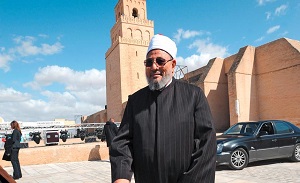Yusuf al-Qaradawi, shadow guide of the Muslim Brotherhood, has died
 The International Union of Muslim Scholars, which the 96-year-old chaired, announced his death. Born in Egypt, he was involved in anti-colonial activities from a young age. He is famous for delivering a major sermon during Friday prayers in Cairo’s Tahrir Square after Mubarak’s ouster.
The International Union of Muslim Scholars, which the 96-year-old chaired, announced his death. Born in Egypt, he was involved in anti-colonial activities from a young age. He is famous for delivering a major sermon during Friday prayers in Cairo’s Tahrir Square after Mubarak’s ouster.
Doha (AsiaNews) – The Muslim Brotherhood has lost one of its most influential spiritual, political and religious figures. Egyptian-born Yusuf al-Qaradawi, one of the fiercest critics of Egyptian President Abdel Fatah al-Sisi and his regime, has died at the age of 96.
The International Union of Muslim Scholars, which Qaradawi chaired, made the announcement, highlighting his important, albeit controversial place, in the Islamic world.
Upon the start of the Arab Spring in Egypt and the Arab world in 2011, Qaradawi was one of the few Muslim clerics to openly support it.
Born on 9 September 1926 in Saft Turab, a village in Gharbia governorate (Nile Delta), he studied at al-Azhar University in Cairo, the most prestigious Islamic university in the world, earning a doctorate in 1973.
In his early years, when Egypt was a British protectorate, Qaradawi became an anti-colonial activist and was repeatedly arrested by the authorities.
He later supported the Muslim Brotherhood, the most important Islamic and social group in the country, founded in 1928. For this, he was arrested and jailed several times, under both King Farouk in the 1940s and President Gamal Abdul Nasser in the 1950s.
In 1961 Qaradawi moved to Doha, after he was appointed dean of the Faculty of Sharia at the newly created Qatar University, becoming a naturalised Qatari citizen seven years later.
A regular guest on al-Jazeera, a Qatar-based international broadcaster, he appeared on various Islamic shows gaining for himself appreciation and support from millions of Muslims around the world.
He returned to Egypt for some time in 2011, following the popular uprising that led to the ouster of Hosni Mubarak. On 28 February 2011, a few days after the latter’s resignation, he led Friday prayers in front of thousands of people in the famous Tahrir Square, in downtown Cairo, which had become the symbol of the protest.
His first appearance after decades of exile, in front of Christians and Muslims, had great symbolic value and represented one of the high points of the post-revolution phase.
After the fall of President Mohammad Morsi, a member of the Muslim Brotherhood overthrown in a military-led coup, he became again an “enemy” of the nation and was sentenced to death in absentia in 2015 for links to a mass escape from prison four years earlier.
Despite his influence over the Muslim Brotherhood and apparent support for the group, Qaradawi repeatedly denied being a member and refused several of the group's requests to hold high-level positions.
His support for the Arab Spring and opposition to al-Sisi are seen as one of the reasons for the diplomatic crisis that broke out between Qatar and several Arab and Gulf countries, resulting in the political, economic, and diplomatic boycott against Qatar by several countries in 2017.
The organisation he chaired, the International Union of Muslim Scholars, was included for years in a list of "terrorist organisations" by Egypt, Saudi Arabia, the United Arab Emirates, and Bahrain. Only after long mediation was it removed from the list last year.
https://www.asianews.it/news-en
